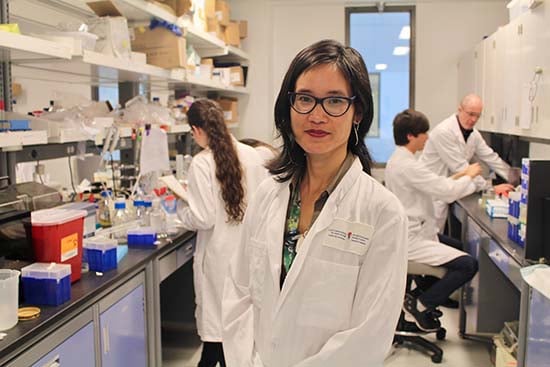Dr. Nguyen’s research team discovered a new cellular enzyme target that can weaken the bacterium Pseudomonas aeruginosa, a daunting microbe which can become highly tolerant to many antibiotics, and thus refractory to antibiotic therapy. The team’s findings are published this week in Proceedings of the National Academy of Sciences (PNAS).
Little is known about the mechanisms leading to tolerance, a strategy that makes bacteria “indifferent” to antibiotics and almost “un-killable,” which results in chronic infections extremely difficult to treat and cure. This research identifies a new means to fight ‘un-killable’ bacteria in healthcare settings.
“We identified a new function important to antibiotic tolerance, which could be targeted to enhance the activity of our current antibiotics,”
says lead study author Dr. Dao Nguyen
In this newest research, Dr. Nguyen and her team have discovered that when P. aeruginosa is under stress or lacking nutrients, it uses a stress signaling system and defense enzyme (superoxide dismutase) to modify its cell membrane, making it less permeable to molecules and preventing antibiotics from penetrating the cell. They found that inhibition of the enzyme activity or the stress signaling system could render the pathogen more susceptible to antibiotics.
“Up until now antibiotic tolerance in slow growing bacteria was widely attributed to the fact that targets of antibiotics were not available or inactive in ‘dormant’ cells. With this research we have shown there is more to it than that. We identified a new link between the stress defense enzyme, the regulation of membrane permeability and antibiotic tolerance.”
Dr. Dao Nguyen
In the long run, the discovery of this promising cellular target could expand the utility of our antibiotics and make new ones more effective.
Read more on the RI-MUHC website here:
New means to fight ‘un-killable’ bacteria in healthcare settings. RI-MUHC News. Sept 13, 2018
Read the entire article here:
Superoxide dismutase activity confers (p)ppGpp-mediated antibiotic tolerance to stationary-phase Pseudomonas aeruginosa. Martins D, McKay G, Sampathkumar G, Khakimova M, English AM, Nguyen D. Proc Natl Acad Sci U S A. 2018 Sep 25;115(39):9797-9802. doi: 10.1073/pnas.1804525115. Epub 2018 Sep 10.
